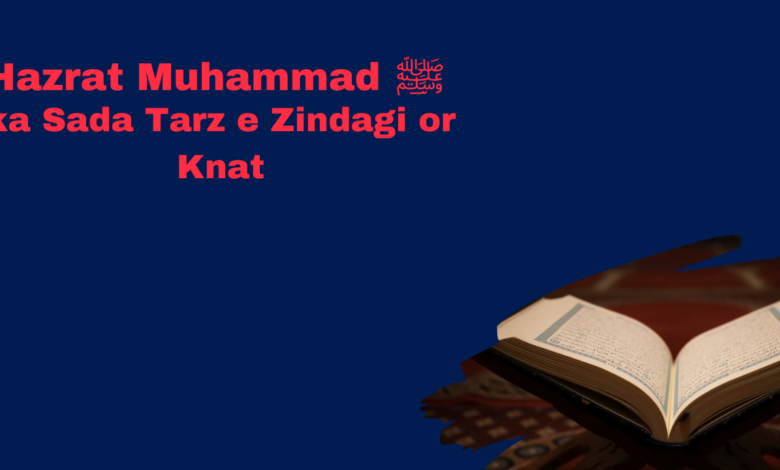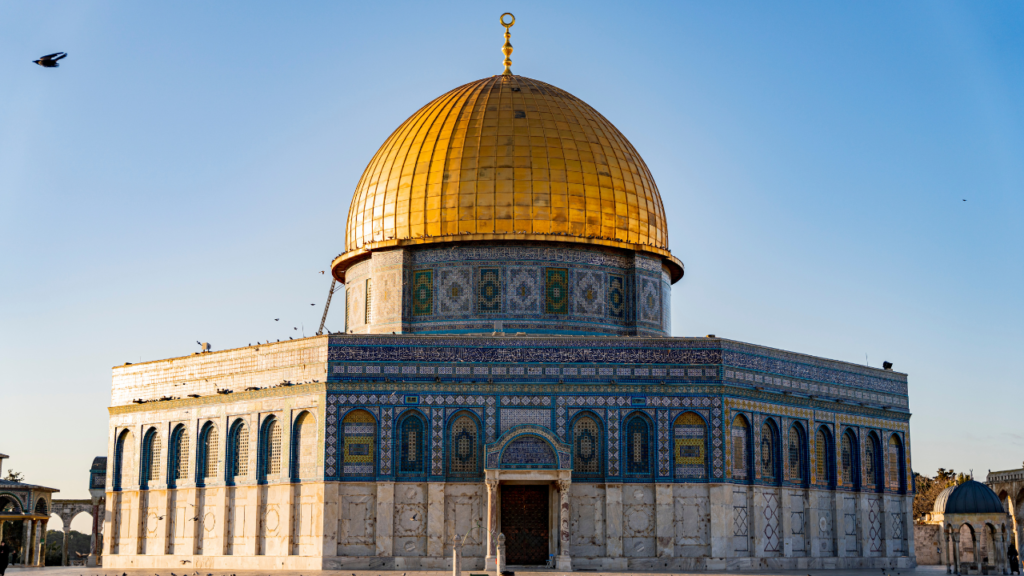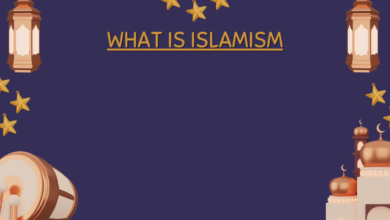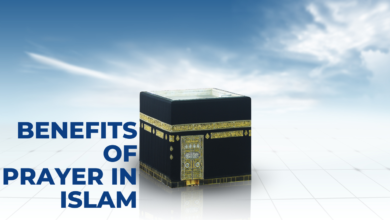Hazrat Muhammadﷺ ka Sada Tarz e Zindagi or Knat
Living the Legacy: Embracing Sada Tarz e Zindagi and Knat in Modern Times

Hazrat Muhammadﷺ ka Sada Tarz e Zindagi or Knat
Sada Tarz e Zindagi, in the context of Hazrat Muhammad’s (PBUH) life, refers to his simple and modest way of living. It encompasses humility, contentment, and a focus on spiritual values over material wealth.

Introduction:
The life of Hazrat Muhammad (PBUH), the last prophet of Islam, serves as a timeless guide for Muslims around the world. His exemplary character, often referred to as the “Sada Tarz e Zindagi” or simple way of life, and his commitment to kindness, compassion, and community service are integral aspects of his legacy. In addition to embodying the teachings of Islam, Hazrat Muhammad (PBUH) was a living example of humility, love, and generosity.
Sada Tarz e Zindagi – The Simple Way of Life:
Hazrat Muhammad (PBUH) lived a life marked by simplicity and humility. Despite being the leader of a growing community, he opted for a modest lifestyle, emphasizing the importance of contentment over material wealth. His dwelling, clothing, and daily routines reflected a dedication to simplicity that aimed to set an example for his followers.
Also check.
Moderation in Lifestyle:
Hazrat Muhammad (PBUH) advocated for moderation in all aspects of life. Whether it was food, clothing, or personal possessions, he encouraged his followers to avoid excess and practice moderation. This approach reflected the Prophet’s understanding of the transient nature of worldly possessions and the importance of focusing on spiritual well-being.
Practical Simplicity:
The Prophet’s life was characterized by practical simplicity. He would actively participate in household chores, mend his own clothes, and engage in manual labor. This hands-on approach reinforced the idea that no task was beneath him, promoting a sense of equality and humility among his followers.
Kindness and Community Service – The Essence of Knat:
The concept of “Knat” refers to acts of kindness, compassion, and community service, embodying the teachings of Hazrat Muhammad (PBUH) regarding social responsibility. The Prophet emphasized the importance of helping others, caring for the less fortunate, and contributing to the well-being of the community.

Compassion Towards Others:
Hazrat Muhammad (PBUH) was known for his compassionate nature. He treated everyone, regardless of their social or economic status, with kindness and respect. His interactions with children, the elderly, and even his enemies showcased the importance of compassion in fostering a harmonious society.
Service to Humanity:
The Prophet’s life was marked by selfless service to humanity. Whether it was resolving disputes, helping the needy, or actively participating in community projects, Hazrat Muhammad (PBUH) demonstrated that true leadership is rooted in service. His actions served as a blueprint for Muslims on how to positively impact their communities.
Charity and Generosity:
Charity (Zakat) and generosity were integral components of Hazrat Muhammad’s (PBUH) teachings. He encouraged his followers to share their wealth with those in need and to cultivate a spirit of generosity. This commitment to charity and helping others contributed to the development of a compassionate and caring community.
Conclusion:
The Sada Tarz e Zindagi and the concept of Knat, as exemplified by Hazrat Muhammad (PBUH), provide a profound guide for Muslims seeking to live a life in accordance with Islamic principles. The Prophet’s simple way of life and his emphasis on kindness, compassion, and community service continue to inspire millions, serving as a timeless model for building a just and harmonious society. By incorporating these principles into their lives, Muslims strive to honor the legacy of Hazrat Muhammad (PBUH) and contribute positively to the world around them.

FAQs
What is Sada Tarz e Zindagi?
Sada Tarz e Zindagi, in the context of Hazrat Muhammad’s (PBUH) life, refers to his simple and modest way of living. It encompasses humility, contentment, and a focus on spiritual values over material wealth.
How did Hazrat Muhammad (PBUH) embody Sada Tarz e Zindagi?
The Prophet lived in a modest manner, practicing simplicity in his clothing, dwelling, and daily routines. He actively participated in household tasks, promoting a lifestyle that emphasized humility and moderation.
What is the significance of Sada Tarz e Zindagi in Islam?
Sada Tarz e Zindagi serves as a model for Muslims, encouraging them to prioritize spiritual well-being and contentment over materialism. It highlights the transient nature of worldly possessions and the importance of living a balanced and humble life.
What does Knat mean in the context of Hazrat Muhammad’s teachings?
Knat refers to acts of kindness, compassion, and community service, reflecting the Prophet’s emphasis on social responsibility. It encompasses helping others, caring for the less fortunate, and actively participating in projects that contribute to the well-being of the community.
How did Hazrat Muhammad (PBUH) exemplify Knat in his life?
The Prophet demonstrated Knat through his compassionate interactions with people from all walks of life. He actively engaged in resolving disputes, helping the needy, and encouraging charity and generosity as fundamental aspects of community service.
Why is Knat considered essential in Islam?
Knat aligns with the Islamic principles of compassion and social responsibility. By practicing kindness and community service, Muslims contribute to the well-being of society, fostering a sense of unity, empathy, and support for one another.
How can individuals incorporate Sada Tarz e Zindagi and Knat into their daily lives?
Individuals can adopt a simpler lifestyle by practicing moderation in their choices and actions. Embracing kindness, compassion, and actively participating in community service initiatives are practical ways to embody the principles of Sada Tarz e Zindagi and Knat.
Is Sada Tarz e Zindagi only about material simplicity?
While material simplicity is a part of Sada Tarz e Zindagi, it also encompasses humility, gratitude, and a focus on spiritual growth. It encourages individuals to find contentment in their hearts and to prioritize values over material possessions.
How does Knat contribute to building a harmonious community?
Knat fosters a sense of community and solidarity by encouraging individuals to actively participate in acts of kindness and service. This builds strong social bonds, promotes empathy, and contributes to the overall well-being of the community.
Are Sada Tarz e Zindagi and Knat relevant in modern times?
Yes, the principles of Sada Tarz e Zindagi and Knat are timeless and remain relevant in modern society. They provide a holistic approach to living a fulfilling life and creating a positive impact on the community, transcending cultural and temporal boundaries.




